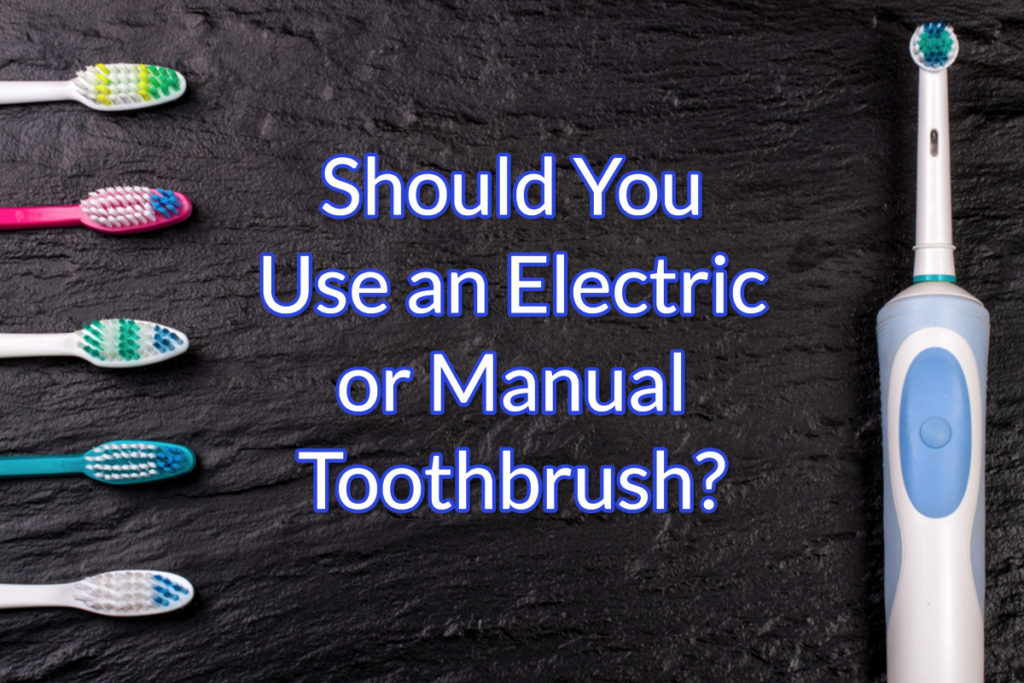Ever since the advent of the electric toothbrush into the mainstream market, the question persists for anyone who is keen on having the best home-care regimen: “Should I use an electric or manual toothbrush?”
With various electric toothbrush companies promising a deeper, user-friendly clean, the traditional toothbrush may appear lackluster, outdated, and even outmoded.
The higher costs of electric toothbrushes also tout them as superior. Especially when they are equipped with fancy features like “ions” and “sonic” waves.
However, with every great innovation, there are caveats to be considered. Just because new inventions come forth it doesn’t mean we throw out the baby with the bath water. Overall, the anatomy of your toothbrush is not going to be your savior.
Instead, adhering to a good oral home care regimen that is consistent, gentle, and thorough is the key to great teeth and gums.
What are the benefits of using an electric toothbrush?
Electric toothbrushes are packed with some awesome features like diverse settings that are suited for intense cleaning to gum care.
Electronic toothbrushes (the pediatric versions) are great for children who have not mastered that manual brush stroke and miss patches of plaque.
These toothbrushes are also ideal for senior citizens who may benefit from an electric toothbrush when managing implants and dentures to properly clean their teeth.
Adults and teens also can benefit from the ease of getting that “fresh from the dentist” clean feeling.
Some toothbrushes, like the Sonicare electric toothbrush, are extremely efficient at removing plaque.
Some models are up to 6 times more efficient than a regular toothbrush.
The electric toothbrush benefits those looking for a deeper clean, with the money to spend on a faster and more efficient way to brush teeth.
Before the electric toothbrush is hailed as the miracle remedy for bad teeth, however, we need to observe some precautions.
What are the drawbacks of using an electric toothbrush?
Electric toothbrushes are getting smarter by the day, each model packed with more features than its predecessor, promising a new feature that is going to be the game changer in cleaning your teeth.
However, the bottom line is you need a tool that will get rid of plaque gently and keep your gums healthy.
Various settings on your electronic toothbrush can increase the intensity of your brush’s “stroke”. Sometimes, however, the intensity can be too high to be used daily.
Over time this heavy brushing which can actually work against your teeth and gums.
The electric toothbrush is very powerful, so it must be used with care. For example, consistently using the “high” setting can result in receding gums and enamel erosion.
For daily use, use the lowest setting and make sure you are not using the toothbrush longer than two minutes. There’s a timer on most of these brushes for a reason. All good tools must have a user who knows how to use them properly.
When it comes to deciding on your tooth cleaning regimen, finances should also be a factor. As you may have noticed, electric toothbrushes are expensive.
Some models cost more than others, with some replacement heads costing the amount of 20-25 manual toothbrushes. The high cost is indeed one con attributed to electronic toothbrushes.
What are the pros of using a manual toothbrush?
The manual toothbrush has been a mainstay in our bathrooms for decades. It has proven to be an effective means of cleaning teeth.
One of its chief benefits is that it doesn’t require electricity to work and it has bristles that are designed to clean your teeth with manual strokes. When a patient knows how to brush their teeth properly, the manual toothbrush is highly effective.
Traditional toothbrushes allow you to be as gentle as you need to be in order to get the job done.
They are much better for your gums and enamel. They are also inexpensive, making it possible to provide the whole family with replacements for a negligible amount of money.
What are the cons of using a manual toothbrush?
It is a fact that after you are done using a manual toothbrush you won’t have that “out of the dentist” feeling of clean. However, your teeth will still be sufficiently clean, especially if you floss daily and use mouthwash.
The number of strokes you can complete manually can’t compete with the automated electronic pulses that an electronic toothbrush delivers.
Also, using any manual toothbrush with medium or hard bristles will have a similar effect as the “high” setting of an electric toothbrush, so when you opt for a manual toothbrush, always go with a soft bristled version.
It’s Up to You!
In the end, whatever toothbrush you choose, your teeth won’t stay healthy if you are inconsistent with your oral care routine.
Choose the toothbrush that you think is right for you and make sure you brush your teeth at least twice a day and floss once a day.
You should also take care to be gentle with your teeth. Use the correct settings and bristle softness to keep your gums and enamel safe. If you have any more questions about which toothbrush to use or have any other dental needs, contact us!


